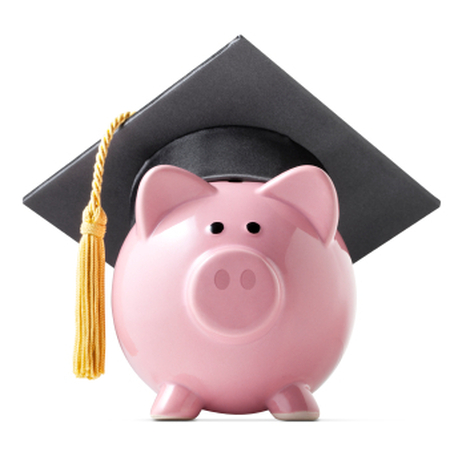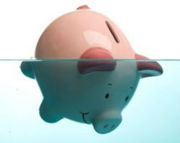Related info:
– Fed Shocked To Find Student Loans Used For Anything But To Learn
– U.S. Student Loan Delinquency Rate Hits New Record High
– Presenting The College Whose Graduates Have A 62% Student Loan Default Rate
– Student Loan Bubble Forces Yale And Pennsylvania University To Sue Their Own Students


The interest rate on new Stafford loans is going to jump from 3.4 percent to 6.8 percent Monday.
– Student Loan Rates Set To Double On July 1 (NPR, June 28, 2013):
The interest rate on government-backed student loans is going to jump from 3.4 percent to 6.8 percent Monday.
Republicans, Democrats and the Obama administration could not agree on a plan to keep it from happening. Lawmakers say a deal is still possible after the July 4 recess. But if they don’t agree on a plan soon, 7 million students expected to take out new Stafford loans could be stuck with a much bigger bill when they start paying the money back.
It has been one of the more heated debates in Washington this year.
Nella Lipton, a business major at the University of Maryland, says she tried to keep up with the news because she’s taking out $10,000 in Stafford loans this school year.
“And it’s kind of sad because you hear about everybody defaulting on their loans when they graduate, but I’m just hoping that with my major, I’ll be able to get a job,” Lipton says.
It upsets her that politicians would add to the stress by not having done something sooner to keep the interest rate from rising.
“They’re sort of putting the burden on a younger generation, and once we are old enough to vote and once we’re part of the economy and we … default on our loans, it’s going to be a big issue, and they’re going to regret it,” she says.
“Student loan interest rates shouldn’t be a political football every year or every couple of years,” says Peter McPherson, president of the Association of Public Land Grant Universities. He says the political impasse over student loan interest rates is serious.
“We need some way to stabilize this process in a way that maintains relatively low interest rates but also has stability,” he says.
McPherson, a former deputy secretary with the Treasury Department, says of all the competing plans lawmakers have considered, the Republican plan and President Obama’s plan make the most sense over the long term.
Both tie student loan interest rates to the 10-year Treasury rate, which is the market rate the U.S. government pays when it borrows.
“Just a little over 2 percent,” McPherson says.
The president’s plan would add another percentage point to that, pushing it up to about 3.4 percent — a rate that students would be able to lock in for the life of their loans.
“I think that’s probably a realistic way to approach it,” McPherson says.
Under the Republican plan, the interest rate for new Stafford loans would start at 5 percent and be allowed to float every year like an adjustable mortgage rate, but would be capped at 8.5 percent. The president’s plan offers no such cap.
Why President Obama and Republicans continue to bicker considering that their plans are similar is disappointing — but not surprising, McPherson says.
“In Washington, we have a hard time doing anything short of the crisis, the cliff, the next moment. But I think in these plans, one could find an acceptable answer,” he says.
Getting students and their parents to understand all of this, McPherson says, is not easy. These proposals are complicated.
Kyle Siefring, a political science major at the University of Maryland, is applying for his first Stafford loan this school year. He says politicians seemingly couldn’t care less about the interest rate students have to pay — for good reason.
“College students don’t vote like other people do,” he says.
But there’s a bigger problem, Siefring says.
“College students aren’t the most financially literate people. They see a bill, and they just think about how they’re going to pay it, and it’s something that they can kind of slip under the table and not necessarily face the consequences right away. It’s just something that they can kind of kick down the road,” he says.
And that’s just like what politicians in Washington do, Siefring says. Congress and the administration are reportedly close to agreeing on a plan to keep interest rates from doubling, but not before the July 1 deadline.
The problem is far deeper as some of your earlier articles have discussed. Today’s students are not 18 years old, they are usually older, and trying to get enough education to get a better job.
The career based economy we used to enjoy is gone thanks to the global free market. Look at radiologists. They used to make a very good living reading x-rays, now, the x-rays are sent to India via the Internet, and the results are back within a few hours. So many good jobs no longer exist here, they have been outsourced. Getting more education is good for the mind, but it may not be much good in getting a decent paying job. Our economic model has been demolished. The only growth these days is debt.
I read in the UK Guardian last week they have just passed a law doubling the rates for student loans, and selling them to private investors. Once I saw that, I realized our congress is doing the same thing. The UK plans to go back 15 years, debts from which there is no relief is good for investors. Our markets have been gutted, about 15% of our stock market consists of real investors, the rest is high frequency trading which simply skims more money off the system. They need some real cash badly, almost as much as many people.
So, lets steal from the students. If they go bankrupt, the student loans, like taxes, are immune to relief. If they die, the debt goes to their heirs. A good deal for the greedy guts.
Now, this article points out something I have noticed, too. Former students, unable to pay the loans back thanks to terrible job conditions, simply defer the loans, kick the can down the road. I see nothing in our economic future to change that.
Even fine universities are opening branches in China……we are an economy of day before yesterday, much like the UK in 1919. Privatizing the student loan repayments won’t help, and it might even hurt some of the greedy guts who buy the loans…….it would break their greedy pumps that pass for hearts.
Our economy here in the west, including Japan, Euro and the USA, is tottering on the brink of collapse. This is just one more example.